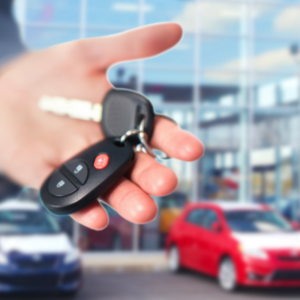Filing for bankruptcy is rough. You may find yourself in a financial hole after filing for bankruptcy wondering what you should do with yourself. Well, the answer is that you should do the same thing you do when you fall off the proverbial horse. You should brush yourself off and get back on! But for those who lost their cars in their bankruptcy proceedings that, unfortunately, is easier said than done. And if this includes you, you’re probably wondering “can I buy a car after bankruptcy?”
Personal Bankruptcy
There are two forms of personal bankruptcy, either of which can result in your car being taken by the bank and sold at auction (the profits of which will go to your debtors). You may sometimes be able to negotiate your car or truck as an exclusion in your bankruptcy proceedings, but that’s unlikely to occur in most cases.

Chapter 7 Bankruptcy
Chapter 7 provides for liquidation. After Chapter 7, all of the debtor’s nonexempt assets are sold (usually at auction) or reduced to cash (i.e. ‘liquidated’). This cash is then distributed to the creditors. You should only consider filing for Chapter 7 if there is no hope of ever being able to repay your creditors. Chapter 7 bankruptcy is usually exercised by individuals, but commercial enterprises may apply.
One of the benefits of filing under Chapter 7 is that most states allow you a decent number of exemptions. Also, you’ll be able to keep all of the salary and wages that you earn after filing. Chapter 7 bankruptcy will not relieve you of your child support, alimony, or student loan obligations. Although in some cases Chapter 7 may be how to build a strong financial foundation, there are certainly some downsides to consider. Among them, you can lose your house and it will affect your credit for at least ten years.
Chapter 13 Bankruptcy
Chapter 13 bankruptcy is for employed people who are in over their heads with debt. To file Chapter 13, you’ll need to present proof of employment and a payment plan to a judge. The judge can then approve your plan to reduce the amount you owe and spread your obligations out over a period of up to five years. This allows you to pay creditors less each month. Chapter 13 is a good way to give yourself some relief without the risk of losing your house or other valuable assets.
All of the above make Chapter 13 a choice for how to build a strong financial foundation. It’s also worth noting that filing for Chapter 13 bankruptcy will stop creditors and collections agencies from calling you at work and harassing your friends and family.
So, What About My Car?
It used to be nearly impossible for those who filed for bankruptcy to buy a car on credit. And that remained true for years, not just immediately after or during their bankruptcy proceedings. Today, however, things have changed. Lenders are now often willing to bend over backward to help potential customers with financing.
While it still may be difficult to get financing for a new car until after you’ve received your official bankruptcy discharge notification, but once you have, yes it definitely possible to obtain financing to buy another car for yourself.
The reason it is difficult to get financing before receiving your bankruptcy discharge notification is that, until then, you still technically have your debts. The actual elimination of your debts only occurs only afterward. This usually takes around 120 days from the time the initial filing of your bankruptcy claim. So, in short, if you need a car for work and you lost yours during your bankruptcy proceedings, don’t worry. There’s hope for you yet.

If you’re considering filing for bankruptcy in South Florida and need help exploring your legal options contact Patrick L. Cordeo, Attorney At Law today at (305) 445-4855.

